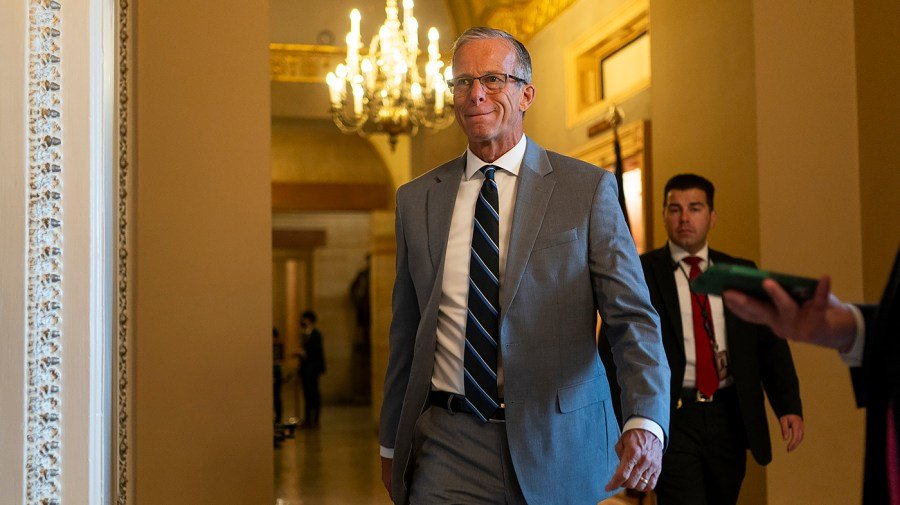
Senate Republicans on Wednesday narrowly voted to table an amendment directing the Department of Justice to release all the files related to convicted sex offender Jeffrey Epstein after Senate Democratic Leader Chuck Schumer (N.Y.) ambushed them with a procedural maneuver that left Senate Majority Leader John Thune (R-S.D.) fuming.
But the 51-49 vote revealed the deep divisions that persist within the party over how to handle the Epstein files amid loud calls from MAGA voters for more transparency.
Sen. Josh Hawley (R), a rising conservative star from Missouri, and Sen. Rand Paul (R-Ky.), a prominent libertarian-leaning conservative, broke with GOP leaders and voted against tabling the Epstein amendment.
“This has been my consistent position,” Hawley told reporters after voting. “My position has long been I think we ought to release those files and trust the American people, just like we did with the MLK files and the JFK files. I think this is a similar deal.”
Hawley noted President Trump said a few months ago the attorney general should release all the Epstein files that aren’t classified.
Thune had little option but to let the Senate vote on releasing the Epstein files, something that Speaker Mike Johnson (R-La.) has worked hard to prevent in the House.
Thune’s other option would have been to pull the annual defense authorization bill — a top GOP priority off the floor.
Senior Republican senators earlier Wednesday expressed confidence that they would have enough votes to table Schumer’s amendment directing Attorney General Pam Bondi to release all Epstein-related files.
“We’re going to table it,” Sen. Lindsey Graham (R-S.C.) said of Schumer’s amendment after walking out of the weekly chairmen’s meeting.
But several Republican lawmakers initially said they were undecided, expressing the need for more “transparency” for Epstein’s crimes.
“We’ll see how it goes. We need to have a discussion about it but I think transparency is always good,” Sen. Joni Ernst (R-Iowa), a member of the Armed Services Committee, said when asked how she would vote on the amendment.
Sen. Thom Tillis (R-N.C.) said he would have voted for Schumer’s amendment if it had a real chance of becoming law but explained that Republican leaders were likely to strip it out of the bill before final passage.
“If there was an amendment on the floor that would have the force of law, I’d vote for it in a heartbeat,” he said.
The drama over the Epstein matter threatens to complicate negotiations on other amendments to the National Defense Authorization Act.
Thune appeared annoyed by Schumer’s surprise maneuver Wednesday morning, when he offered his amendment directing the Justice Department to release all Epstein-related files.
“It’s a political stunt and we’ll dispose of it,” Thune said.
Schumer said the vote would show whether Republicans really want to publicize Epstein-related documents that could implicate other powerful, well-connected people who might have participated in the sexual abuse of teenagers.
“If Republicans vote no, they’ll be saying to the American people you should not see the Epstein files. I ask my Republican colleagues, after all those years you spent calling for accountability, for transparency, for getting to the bottom of these awful crimes, why won’t you vote yes?” Schumer said on the floor.
The GOP leader was in the process of negotiating amendment votes on the must-pass defense bill Wednesday when Schumer jumped the line and brought up his amendment, temporarily seizing control of the floor process.
Sen. John Kennedy (R-La.) said he didn’t know whether he would support the amendment, noting it came as a surprise.
“I haven’t looked at it yet,” he said. “I just found out what Chuck did and have got to look at it.”
Kennedy also wondered why Thune didn’t immediately fill the amendment tree on the Senate floor to block Democrats from offering amendments to the defense bill.
“I don’t know why we didn’t have the tree filled. You can fill the tree and always unfill it later,” he said. “I don’t know why we left the spot open on the tree. But we did and Schumer jumped on it like wet on water.”
“I can’t fault him for being shrewd in terms of his use of the rules,” Kennedy added.
Schumer’s amendment is the same legislation that Reps. Thomas Massie (R-Ky.) and Ro Khanna (R-Calif.) are pressing to get considered in the House.
Massie and Khanna are circulating a discharge petition to circumvent Speaker Mike Johnson (R-La.) and force a vote on the measure in the lower chamber.
Johnson urged Republican colleagues at a meeting earlier this month not to support the discharge petition and instead support the House Oversight and Government Reform Committee’s effort to dig up more information about Epstein-related materials held by the Justice Department.
When asked Tuesday how he would handle any House-passed measure to require fuller disclosure of Epstein documents, Thune declined to comment but said he thought it important to promote transparency.
“What I can tell you is — and I think this is my position, and my colleagues can speak for themselves — but I believe transparency is always best, and you should get as much information out there as you possibly can, in a way that obviously protects the rights of the victims,” he said.
Democrats now have the option of using the vote to table Schumer’s amendment as political ammo in the midterm election to attack Republicans over Epstein, a subject that has riveted some members of the GOP base for months.
Sen. Susan Collins (R-Maine), who faces a competitive reelection race next year, noted members of the Appropriations Committee had already adopted an amendment to the annual appropriations bill for the departments of Commerce, Justice and State that instructed the Justice Department to deliver a detailed report to Congress about the Epstein-related files in its possession.
“What Sen. Schumer apparently does not realize is that one of his own members, Sen. Van Hollen, offered an Epstein amendment to the CJS Appropriations Committee. It was adopted and that’s where it belongs,” she said, referring to Sen. Chris Van Hollen (D-Md.).
Collins said that bill and the Epstein amendment attached to it would have passed if Van Hollen didn’t later block the spending measure over a separate dispute related to transferring the FBI headquarters to a new location.
When Democrats controlled the Senate from 2021 to 2025, Schumer, the majority leader at the time, regularly filled the amendment tree when bills came to the Senate floor in order to protect vulnerable Democrats from taking tough votes.
Sen. Mitch McConnell (R-Ky.), who served as Senate majority leader from 2015 to 2021, also employed the tactic regularly to block controversial amendments from getting votes.
But Thune, who was elected majority leader in November, promised to bring regular order back to the Senate by giving senators more opportunity to debate and vote on amendments.
He was working on setting up amendment votes when Schumer took advantage of a lull in the floor action to force his amendment into consideration.
Some Republicans accused Schumer of taking advantage of Thune’s good-faith effort to have a bipartisan floor debate.
“This will be viewed as a hostile act by our folks,” a source familiar with Republicans’ reaction to the move said. “We were engaged in bipartisan talks on amendments, and this could jeopardize that.”
Schumer, however, said on the floor that he jumped at the chance to force a vote on his amendment because he believes it’s critical that Americans learn the full truth about Epstein’s activities.


